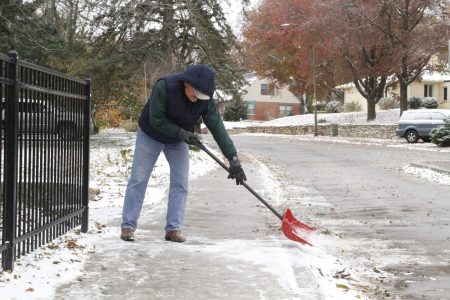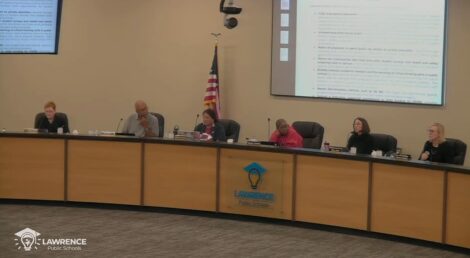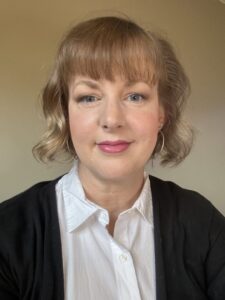With a program manager now at the helm, Common Ground looks to break ground on future garden sites with equity in mind
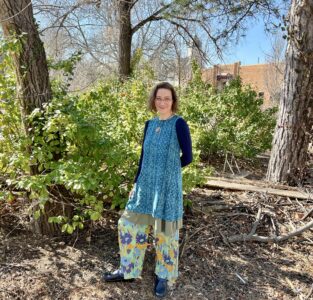
photo by: Douglas County Sustainability Office
Umut Bayramoglu recently joined Common Ground as its first program manager.
Lawrence’s Common Ground program — a community gardening and urban agriculture program with nearly a dozen garden spaces around the city — has a new leader at the helm and multiple goals to pursue.
The New Common Ground program manager, Umut Bayramoglu, stepped into her role just last week. She told the Journal-World from her new space in Douglas County’s Sustainability Office, 1006 New Hampshire St., that two of her main goals were determining the most equitable way to develop garden sites — the program plans to add a new site later this year — and offering opportunities for community members to learn more about urban gardening.
The program has already grown a fair amount since it was established in 2012. It quickly expanded to seven sites by its second year and was looking to expand again just a few years later in 2016.
Today, along with an incubator farm at the edge of Lawrence providing low-cost, large-tract rentals for beginning market growers, Common Ground has 10 urban garden sites throughout the city:
• John Taylor Park Incubator Garden – 200 N. Seventh St.
• Just Food Garden – 817 Oak St.
• Little Prairie Community Garden – Peterson Road at Nigel Drive
• Growing Together Garden – West Third Street at Alabama Street
• Pearl Clark Community Garden – 639 Illinois St.
• PermaCommons – 1304 Pennsylvania St.
• Penn Street Community Garden – 1313 Pennsylvania St.
• Oread Friends – 1146 Oregon St.
• Lawrence Community Orchard – 830 Garfield St.
• Prairie Block Orchard – 900 E. 15th St.
Bayramoglu is the first dedicated program manager in the program’s history. Up until now, it’s been managed jointly by the City of Lawrence and Douglas County, with additional help from volunteer garden managers and a part-time incubator farm coordinator who have acted more independently at their own sites. While not discounting the work to build the program over the past decade, Bayramoglu said her role should bring cohesion and a long-term strategy to the table.
Bayramoglu, originally from Istanbul, Turkey, came to Kansas on a foreign exchange student scholarship and graduated from Blue Valley High School, then the University of Kansas, before becoming a naturalized U.S. citizen in 2008. She previously worked in journalism as an associate editor for Mother Earth News, a Topeka sustainability magazine owned by Ogden Publications, and as a reporter for the Kansas City Star.
“(It’s like) somebody wrote this job for me, because it brings together all of my passions,” Bayramoglu said. “It brings my social justice passion, my food liberation passion — and of course with my journalism and writing background, I geek out about grants and stuff.”
Bayramoglu also has deep roots in Lawrence, in more ways than one; she described to the Journal-World a long history of establishing her own urban gardens wherever she’s lived throughout the city. In fact, the first year she got into gardening, she was fortunate enough to live in North Lawrence and was able to take full advantage of the good soil courtesy of the Kansas River bottom.
“Every seed I threw down in the ground became this amazing plant,” Bayramoglu said. “I had like 20 tomato plants and 30 peppers my first year, and I was hooked after that.”
Bayramoglu recognizes it’s something of a privilege that she’s been able to grow her own gardens everywhere she’s moved, despite being a renter and not an owner. She has benefited from “very nice landlords,” she said.
But not all city dwellers have accommodating landlords, or perhaps they live in apartments with zero lawn space to begin with. Barriers like that prevent them from growing their own food. Bayramoglu has realized through her own experience that land access is an issue that makes Common Ground all the more important.
“That’s huge, and that’s why the expansion of Common Ground is super exciting,” Bayramoglu said. “Obviously, the program is extremely popular, and we’re almost full-up at the incubator farm; we have a few plots available in some of the gardening spots. But we are thrilled that this public health project is basically just gifting us this beautiful new space.”
…
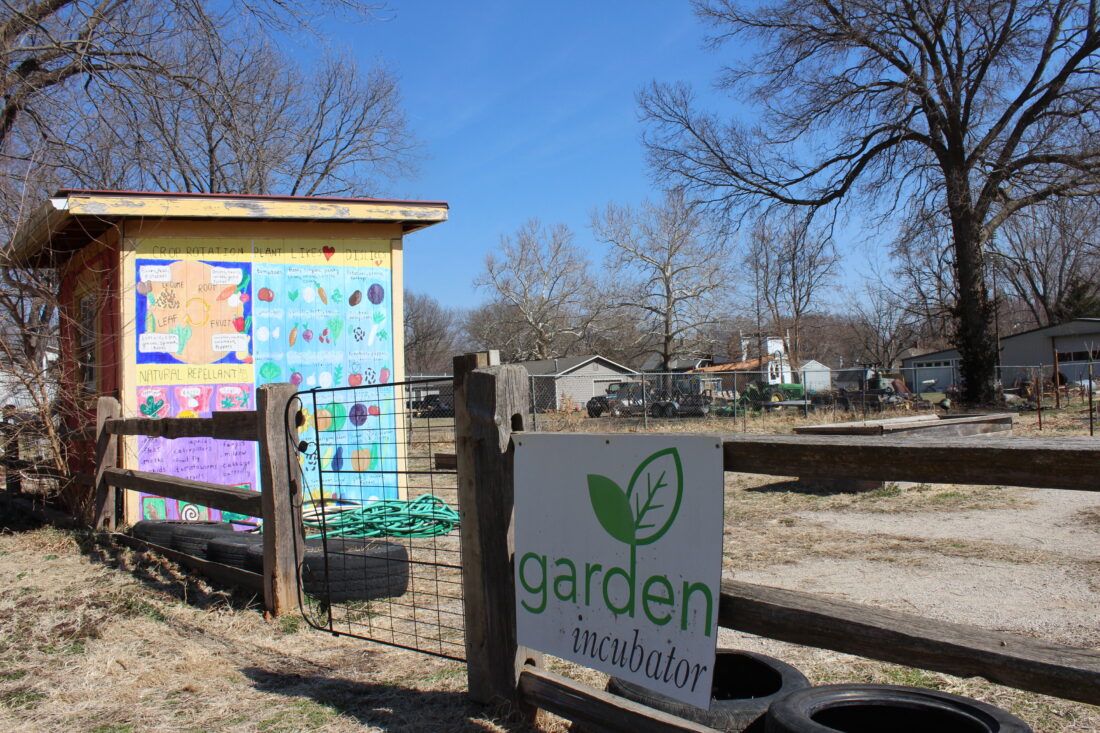
photo by: Austin Hornbostel/Journal-World
The John Taylor Park Incubator Garden, 200 N. Seventh St., is one of several Common Ground urban garden sites throughout Lawrence. The program aims to add another site this year.
Bayramoglu is referring to a Kansas Department of Health and Environment grant project via Lawrence-Douglas County Public Health. Laura McCulloch, a community health equity specialist with the health department, has for the past two years managed a KDHE Chronic Disease Risk Reduction grant, which is given to communities across the state to address specific risk factors for chronic diseases — like tobacco use, nutrition and physical activity.
McCulloch said the process of writing up the grant application for the 2022 fiscal year began in early 2020. At the time, she said she was looking to community partners to help determine what priorities the community would want her to include in the scope of the grant’s work.
One of those entities was the Douglas County Food Policy Council’s health equity work group, and that put McCulloch in contact with Kim Criner Ritchie, who today serves as the county’s interim sustainability director. Together with representatives from the Sustainability Office, the group decided the Common Ground expansion seemed to have the most community interest of the different topics they discussed, and McCulloch said she decided to write it into the grant.
The goal, as conveyed in the grant, is to “engage underserved and traditionally marginalized residents in public local food programs” and to “expand food production on public land.”
“So looking through an equity lens as the way we were guiding these improvements,” McCulloch said, “how can we make this more accessible to more people in the community, particularly those members of our community that may be underserved?”
To that end, McCulloch said the health department was able to bring on consultant Kali Deno, who has been engaging in conversations with the community and partner organizations about the barriers they see to community gardening. That includes gathering feedback at events and through a survey. The survey should be collecting responses through March and April, according to the county, and they’re encouraging the public to take it.
Bayramoglu and Deno will host an open house March 27 at the Lawrence Public Library from 10 a.m. to noon to gather even more public feedback.
The whole point, McCulloch said, is to nurture a community-led process that can help determine how the program approaches adding future garden sites.
• • •
The grant will allow the program to break ground on a new garden site sometime this year, Bayramoglu said. For now, the tentative plan is to pick a new site by June; the KDHE grant year ends June 30. As for where it’ll be, Bayramoglu said they’re currently determining that through community feedback.
Beyond that new garden, Bayramoglu said there’s plenty more work to be done in the coming months in her new role. The grant funding her position — a three-year Conservation Collaboration grant awarded to the county through the USDA’s Natural Resources Conservation Service — specifically mandates that she develop educational programming, for example, so Bayramoglu said she’s planning on developing two educational workshops per year. She said she’d expect to host one early in the gardening season around June and another later in the season around September.
“Those workshops will be, obviously, for our gardeners and farmers, but they will be open to the public as well,” Bayramoglu said. “And that’s exciting to me because as people are thinking about getting into a Common Ground plot, they can come to these workshops and get an idea of ‘Ok, here’s a pollinator workshop; oh, I really like native gardens, that’s a neat idea.’ Or here’s another one about composting and rain barrels. They will have the tools and they will have the education.”
Bayramoglu is also required to provide hands-on technical support at community farm sites. Once the season starts, she said she’s more likely to be out in the field rather than in her office. Another objective is piloting a farmer apprenticeship program in 2023 and 2024 at the incubator farm.
Keeping an eye out for opportunities for community partnerships is also a goal. Bayramoglu said she has “dreams of grandeur” in regard to working with Just Food, where outreach could touch an even wider range of community members in Lawrence. She also mentioned potential collaborations with the Sunrise Project, which has its own community garden separate from the Common Ground program, and Douglas County Master Gardeners.
“Really, this is just one of those programs that brings in the best of Lawrence,” Bayramoglu said. “So many people are interested in sustainability issues, so many people are interested in food security, so many people are interested in social justice. We get to utilize all these community partnerships and just make everything more sustainable.”




